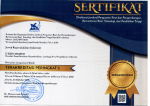MENGEMBANGKAN MADRASAH ALIYAH NEGERI INSAN CENDIKIA UNTUK MENJAWAB TANTANGAN MODERNISASI, DEMOKRATISASI DAN GLOBALISASI (DEVELOPING INSAN CENDIKIA HIGH SCHOOL TO ADDRESS MODERNISATION, DEMOCRACY, AND GLOBALISATION CHALLENGES)
Abstract
Madrasah Aliyah Negeri Insan Cendekia (MAN-IC) faces, similar with other schools, disfunctional in preparing people that are more qualified, if the institution does not reform it-self along with the strategic challanges which are developing. MAN-IC, that was build based on Modernist-Islam spirit, is a model madrasah especially with regard to its religious and science & technology teaching practices. Nowadays, this institution is not only challanged with old challanges, that are searching Islamic as well as Indonesian characters and modernization, but also with the new ones, that are democratization including local otonomy and globalization. Rapid Assessment method to see its governance, management, curriculum, and teaching-learning aspects within the two of three existing MAN-ICs (which are located in Jakarta and Jambi) reveals the imbalances and unreadiness of those institution in facing those challanges. Reform on those aspects proposed by this article is assumed to be empowering its responsive ability in preparing future
Keywords
Full Text:
PDFReferences
Amirrachman, Alpha, Saefudin Syafi’i, dan Anthony Welch. 2009. Decentralising Indonesian Education: The Promise and the Price dalam J.
Zajda and D.T. Gamage (eds.), “Decentralisation, School-Based Management, and Quality”, Globalisation, Comparative
Education and Policy Research 8, hlm.141- 157.
Aronowitz, Stanley dan Henry A .Giroux. 1990. Post Modern Education: Politics, Culture dan Social Criticism. Oxford: University of Minessota Press.
Becker, Harry S. 1975. Investment in Human Capital: with special reference on education. California: University of Berkeley.
Bourdieu, Pierre. 1986. Distinction: A Social Critique of the Judgement of Taste, trans. Richard Nice. London: Routledge and Kegan Paul.
Bourdieu, Pierre dan Jean-Claude Passeron. 1977. Reproduction in Education, Society and Culture. Los Angeles: Sage Publication.
Brugmans, I.J. 1987.“Politik Pengajaran,” dalam Politik Etis dan Revolusi Kemerdekaan, H.
Baudet dan I.J. Brugmans (eds.) Jakarta: Yayasan Obor.
Bush, Robin. 2003. Akar Kultural “Civil society” NU, dalam Burhanuddin (ed.), Mencari Akar Kultural Civil society di Indonesia. T.t. INCIS-CSSP-USAID, 2003:28-36.
Fukuyama, Francis. 2007. Identity and Migration. Prospect Magazine Issue 131, 25th February 2007.
Furnivall, J.S. 1943. Educational Progress in South East Asia, New York: Institute of Pacific Relations.
Giroux, Henry A. 1981. Ideology, Culture and the
Process of Schooling. Washington DC: Falmer
Press.
Gouldner, Alvin W. 1979. The Future of Intellectuals
and the Rise of the New Class. London: The Macmillan Co.
Habermas, Jurgen. 1991. The Structural Transformation of the Public Sphere. Cambridge: The MIT Press.
Inkeles, A. and D.H. Smith. 1974. Becoming Modern: Individual Change in Six Developing Countries. Cambridge: Harvard University Press.
Jackson, Robert. 2011. Cameron, 'multiculturalism' and education about religions and beliefs http://www2.warwick.ac.uk/fac/soc/wie/research/wreru/)
Jacques, Martin. 2010. When China Rules the World. New York: The New York Sindicates.
Jowett S, Baginsky M. 1988. Parents and education: a survey of their involvement and a discussion of some issues. Educ Res 30(1):hlm. 36–44
Kymlicka, Will. 1995. Multicultural Citizenship. New York: Oxford University Press.Inc.
Martin, David. 1978. A general Theory of Secularization. Agincourt: The Book Society of Canada.
Ma’ruf, Jamhari “Komunalisme atau “Civil Society”? dalam Burhanuddin (ed.), Mencari Akar Kultural Civil society di Indonesia. T.t. INCIS-CSSP-USAID, 2003, hal.25-28.
Noor, Farish A. Yoginder Sikand and Martin van Bruinessen. 2007. Introduction: Behind the Walls: Re-Appraising the Role and
Importance of Madrasas in the World Today, dalam The Madrasa in Asia. Farish A. Noor, Yoginder Sikand dan Martin van Bruinessen
(Eds). Amsterdam: Amsterdam University press, hlm. 9-30.
Ohmae, Kenichi. 2002. Memudarnya Negara-Bangsa. Jakarta: Qalam
Pradhan, Menno. Daniel Suryadarma, Amanda Beatty,Maisy Wong, Armida Alisjahbana, Arya Gaduh, Rima Prama Artha. 2013.
Improving Educational Quality Through Enhancing Community Participation:results from a randomized field experiment in Indonesia, The World Bank.
Sujatmiko, Iwan Gardono. 2003. Wacana Civil society di Indonesia, dalam Burhanuddin (ed.) Mencari Akar Kultural Civil society di
Indonesia. T.t.INCIS-CSSP-USAID, hlm.40-56.
Suparno, Paul. 2000. Kurikulum SMU yang Menunjang Pandidikan Demokrasi, dalam Sindhunata (ed.) Membuka Masa Depan
Anak-anak Kita: Mencari Kurikulum Pendidikan Abad XXI. Yogyakarta: Kanisius, hlm.50-67.
Suyanto. 2013. Negara Adikuasa Pendidikan. Kompas Kamis, 10 Januari 2013, hlm. 7.
Terry Mart. 2012. Menuju Pendangkalan Nalar. Kompas, Kamis 27 Desember 2012, hlm. 6.
Tilaar, H.A.R. 2003. Kekuasaan dan Pendidikan. Magelang: Indonesiatera.
Tsuchiya, Kenji. 1987. Democracy and leadership: The Rise of The Taman Siswa Movement in Indonesia.Transl. Peter Hawkes. Honolulu: University of Hawaii Press.
USAID & DBE3, 2007. Analysis of the Current Situation of Islamic Formal Junior Secondary Education in Indonesia. ddpext.
worldbank.org/ Edstats/IDNdprep07.pdf.
Zamroni. 2001. Pendidikan untuk Demokrasi:
Tantangan Menuju Civil society. Yogyakarta:
Bigraf Publishing.
DOI: https://doi.org/10.14203/jki.v9i2.41
Copyright (c) 2016 Jurnal Kependudukan Indonesia

This work is licensed under a Creative Commons Attribution-NonCommercial-ShareAlike 4.0 International License.
-----------------------------------------------------------------------------------------------------------------------------
Research Center for Population, Indonesian Institute of Sciences
Widya Graha Building, 7th and 10th floors
Jl. Jenderal Gatot Subroto 10 Jakarta Selatan, Telp (021) 5221687
Website: http:/kependudukan.lipi.go.id;
E-Journal: http://ejurnal.kependudukan.lipi.go.id
Pustaka: http://pustaka.kependudukan.lipi.go.id
-----------------------------------------------------------------------------------------------------------------------------








